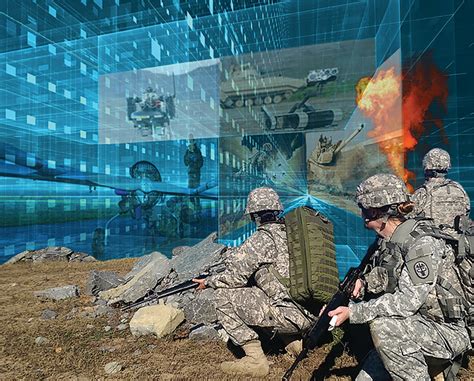The face of modern warfare is undergoing a significant transformation, driven by advancements in technology that are redefining the nature of combat. The integration of cutting-edge innovations is not only enhancing the effectiveness of military operations but also raising fundamental questions about the ethics and future of warfare. Here, we delve into seven futuristic war technologies that are reshaping the battlefield.
1. Autonomous Drones and Robots

The use of autonomous drones and robots in warfare represents a significant leap forward in military technology. These unmanned systems can operate without human intervention, executing complex missions with precision and speed. Equipped with advanced sensors and AI algorithms, they can identify and engage targets autonomously, reducing the risk of human casualties.
Benefits and Concerns
- Enhanced Surveillance: Autonomous drones can provide real-time battlefield intelligence, improving situational awareness and informing strategic decisions.
- Precision Strikes: With the ability to autonomously identify and engage targets, these systems can reduce collateral damage and civilian casualties.
- Ethical Concerns: The use of autonomous lethal weapons raises ethical questions about accountability and the potential for unintended harm.
2. Cyber Warfare Capabilities

Cyber warfare represents a new frontier in modern combat, where the battlefield is not confined to physical spaces but extends into the digital realm. Military forces are increasingly developing capabilities to disrupt, disable, and deceive enemy systems through cyber operations.
Impact on Modern Warfare
- Critical Infrastructure Disruption: Cyber attacks can cripple critical infrastructure, such as power grids and communication networks, significantly impacting an enemy's ability to wage war.
- Information Dominance: Cyber warfare can provide an information advantage, allowing forces to anticipate and counter enemy actions more effectively.
- Attrition of Enemy Capabilities: Cyber operations can degrade an enemy's military capabilities, reducing their effectiveness in combat.
3. Hypersonic Missiles

Hypersonic missiles, capable of flying at speeds greater than Mach 5, are revolutionizing the concept of long-range strike capabilities. These missiles can rapidly reach targets across vast distances, challenging traditional air defenses and redefining the speed at which military operations are conducted.
Implications for Deterrence and Defense
- Enhanced Deterrence: The possession of hypersonic missiles can serve as a powerful deterrent, influencing an adversary's calculus on the potential costs of conflict.
- Challenges to Air Defense Systems: The speed and maneuverability of hypersonic missiles pose significant challenges to existing air defense systems, necessitating the development of new countermeasures.
- Prompt Global Strike Capabilities: Hypersonic missiles enable prompt global strike capabilities, allowing forces to rapidly respond to emerging crises worldwide.
4. Advanced Soldier Systems

The development of advanced soldier systems is aimed at enhancing the combat effectiveness and survivability of individual soldiers. These systems integrate advanced materials, sensors, and communications technologies to provide soldiers with real-time battlefield information and improved protective gear.
Enhancing Combat Effectiveness
- Improved Situational Awareness: Advanced soldier systems provide real-time battlefield intelligence, enhancing a soldier's ability to make informed decisions under fire.
- Enhanced Survivability: Advanced protective gear and medical technologies can reduce casualties and improve the treatment of wounds.
- Increased Operational Flexibility: With the ability to operate more effectively in a variety of environments, advanced soldier systems expand the scope of military operations.
5. Artificial Intelligence in Warfare

Artificial intelligence (AI) is being increasingly integrated into various aspects of military operations, from command and control systems to autonomous weapons. AI can analyze vast amounts of data, identify patterns, and make predictions, significantly enhancing the effectiveness of military decision-making.
AI and Military Decision-Making
- Data-Driven Insights: AI can process and analyze large datasets, providing commanders with critical insights that inform strategic decisions.
- Predictive Capabilities: AI algorithms can predict enemy actions and identify potential vulnerabilities, enabling proactive measures to counter emerging threats.
- Autonomous Operations: AI is key to the development of autonomous weapons and drones, which can operate independently to achieve military objectives.
6. Directed Energy Weapons

Directed energy weapons, including lasers and microwave systems, are being developed for various military applications. These weapons can engage targets with precision and speed, potentially revolutionizing the way military forces conduct operations.
Advantages and Challenges
- Precision Engagement: Directed energy weapons can engage targets with high precision, reducing collateral damage.
- Speed of Engagement: These weapons can engage targets rapidly, potentially before an adversary can react.
- Technological Challenges: The development of directed energy weapons faces significant technological hurdles, including power generation and beam control.
7. Space-Based Assets

Space-based assets are playing an increasingly critical role in modern warfare, providing military forces with a strategic advantage through enhanced communications, navigation, and surveillance capabilities.
Role in Modern Warfare
- Global Connectivity: Space-based communications enable global connectivity, facilitating command and control across vast distances.
- Precision Navigation: Space-based navigation systems, such as GPS, enable precision navigation and targeting.
- Enhanced Surveillance: Space-based sensors can provide real-time surveillance of the battlefield, enhancing situational awareness.






As technology continues to evolve, the nature of warfare is likely to undergo further significant transformations. Understanding these advancements and their implications is crucial for military strategists, policymakers, and anyone interested in the future of combat.
What role does artificial intelligence play in modern warfare?
+Artificial intelligence plays a critical role in modern warfare, enhancing military decision-making, autonomous operations, and predictive capabilities.
How are hypersonic missiles changing the nature of warfare?
+Hypersonic missiles are revolutionizing the speed at which military operations are conducted, challenging traditional air defenses and enhancing long-range strike capabilities.
What are the ethical considerations surrounding the use of autonomous weapons?
+The use of autonomous lethal weapons raises ethical questions about accountability, the potential for unintended harm, and the responsibility for actions taken by autonomous systems.
As we navigate the complexities of these emerging technologies, it's essential to engage in a broader discussion about their implications and the future of warfare.
